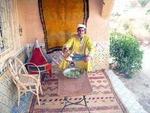Partnership between UNDP and World LP Gas Association provides clean energy to rural areas of Morocco
In many developing countries, including Morocco, there is still a high dependence on traditional biomass fuel in rural areas, which has many negative consequences, such as deforestation, greenhouse gas emissions, health issues and gender inequality. Liquid Petroleum Gas (LPG) represents a safe and clean alternative to traditional energy sources.
The “Liquid Petroleum Gas Rural Energy Challenge” was launched in six pilot countries as a partnership between the United Nations Development Program (UNDP) and the World LP Gas Association (WLPGA) with the aim of providing access to clean energy through use of LP Gas, improving standards of living in rural areas and creating a viable and commercially sustainable LP Gas market. In Morocco, the programme, launched in 2005, was coupled with a microfinance initiative aimed at financing new or existing LPG-based businesses.
135 loans were given to small and micro businesses in different sectors such as hotels, restaurants and artisans, totaling 135,200 USD. In addition, the project is empowering women, who represent about 27% of loan holders, and increased awareness in rural areas about the dangers and health
hazards of using traditional biomass fuels. The use of LPG also decreases air pollution due to smoke generated by burning traditional biomass fuels, and reduces illegal cutting of wood from forested areas.


